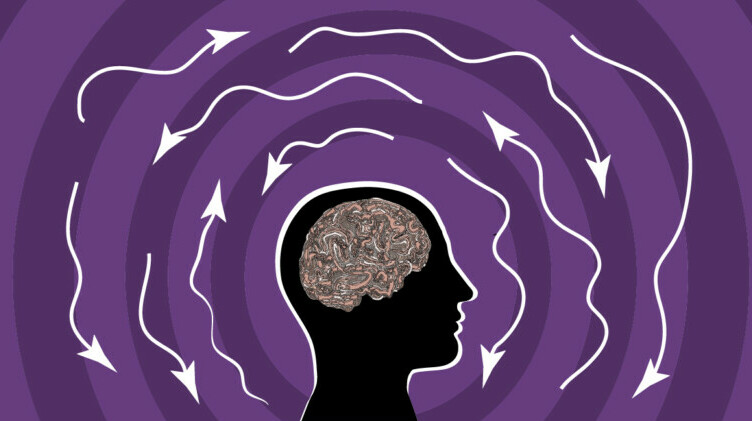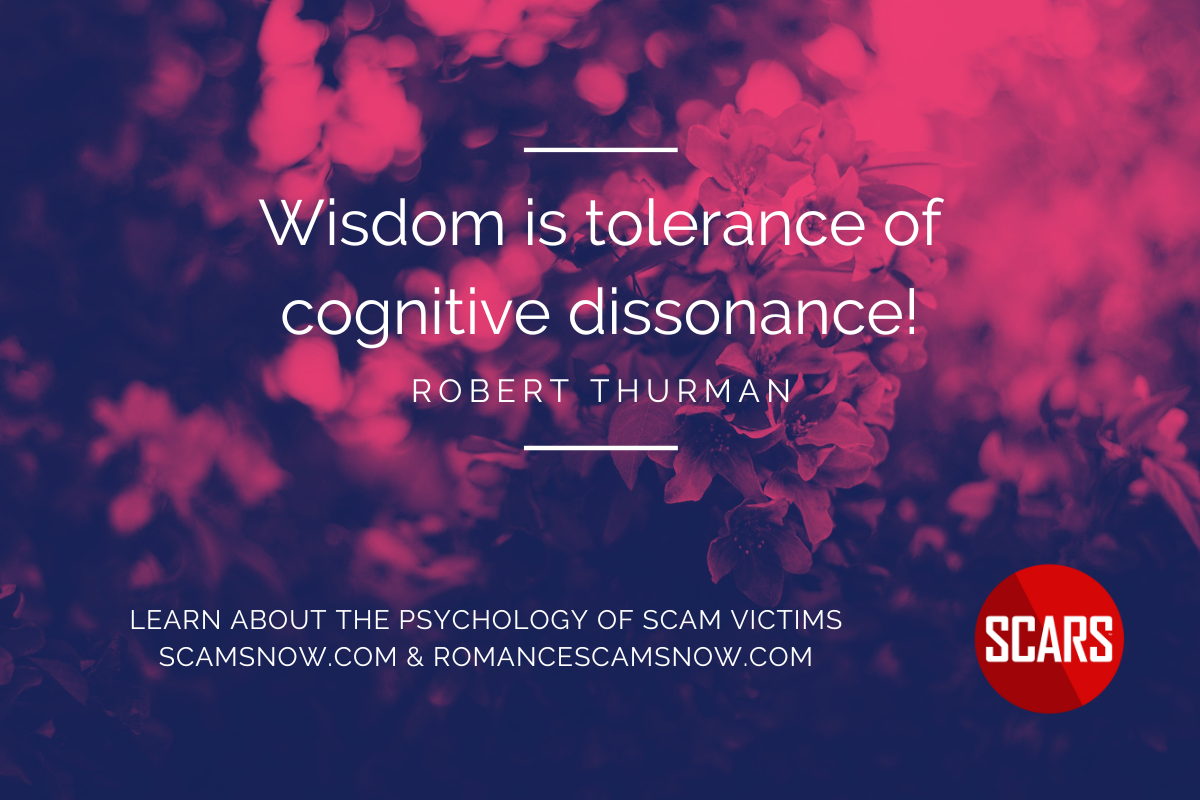Helping Scam Victims Understand Cognitive Dissonance
Understanding Why Scams Can Have Such a Profound Impact on Scam Victims
Scam Victim Recovery Psychology
Authors:
• Vianey Gonzalez B.Sc(Psych) – Licensed Psychologist Specialty in Crime Victim Trauma Therapy, Neuropsychologist, Certified Deception Professional, Psychology Advisory Panel & Director of the Society of Citizens Against Relationship Scams Inc.
• Tim McGuinness, Ph.D. – Anthropologist, Scientist, Director of the Society of Citizens Against Relationship Scams Inc.
About This Article
Cognitive dissonance in scam victims emerges when they confront evidence contradicting their beliefs about the scam.
The realization of being deceived triggers emotional distress, further impairing cognitive function. Chronic stress from coping with the scam’s aftermath also contributes to physiological changes in the brain, affecting areas responsible for higher-order thinking. This psychological conflict exacerbates brain impairment or “brain fog,” leading to confusion and difficulty in processing information.
Recognizing these challenges is crucial for supporting scam victims in their recovery journey, as addressing cognitive dissonance and brain impairment requires specialized intervention. By providing appropriate support and guidance, individuals can better navigate the complex emotions and cognitive difficulties associated with being a scam victim, ultimately aiding in their healing process.
Unraveling the Cognitive Dissonance of Scam Victims: The Profound Impact of Trauma and Grief
In the digital age, where connectivity is ubiquitous, the prevalence of scams targeting unsuspecting individuals has surged, leaving a trail of emotional devastation in its wake. When victims discover they have been deceived, a profound sense of cognitive dissonance often ensues, compounded by the trauma and grief of realizing their trust has been violated. This article delves into the intricate web of emotions and cognitive processes that scam victims grapple with, shedding light on the challenges they face in reconciling their beliefs and experiences.
Cognitive dissonance, a term coined by psychologist Leon Festinger, refers to the discomfort experienced when individuals hold conflicting beliefs or attitudes. In the context of scam victims, this dissonance arises from the stark contrast between their perception of reality and the harsh truth of being duped. Despite the evidence pointing to deception, victims may struggle to accept the reality of their situation, clinging to the belief that they couldn’t have been so easily deceived.
Trauma and grief further exacerbate this cognitive dissonance, amplifying feelings of disbelief, shame, and self-blame. Victims may grapple with intrusive thoughts, replaying the events leading up to the scam in a futile attempt to make sense of what happened. The loss of financial security, trust in others, and sense of identity can plunge individuals into a state of emotional turmoil, where rationality is clouded by overwhelming emotions.
In the aftermath of discovering a scam, victims may exhibit signs of cognitive impairment, such as memory lapses, difficulty concentrating, and impaired decision-making. This cognitive fog, fueled by stress and emotional distress, can further exacerbate feelings of helplessness and vulnerability. As victims navigate the complexities of their emotions, they may find themselves trapped in a cycle of rumination and self-doubt, unable to break free from the grip of cognitive dissonance.
Cognitive Dissonance – Why Does it Happen?
In the case of scam victims, cognitive dissonance arises from the clash between their existing beliefs or perceptions and the contradictory information presented by the scam and its aftermath. This conflict triggers a state of psychological discomfort, prompting individuals to rationalize or reinterpret their experiences to alleviate the dissonance. Several factors contribute to the development of cognitive dissonance in scam victims:
- Trust and Betrayal: Scam victims often begin their interactions with a sense of trust in the scammer or the legitimacy of the situation or relationship. When this trust is betrayed by the revelation of the scam, it creates a profound sense of cognitive dissonance as victims struggle to reconcile their initial perceptions with the reality of deception.
- Self-Image and Identity: Scam victims usually have a positive self-image or identity tied to their perceived competence, intelligence, or judgment. The realization that they have been deceived challenges this self-concept, leading to cognitive dissonance as victims attempt to maintain a consistent sense of self-worth.
- Emotional Investment: Victims of scams have invested significant emotional energy, time, or resources into the fraudulent relationship or scheme. When confronted with evidence of deception, they experience cognitive dissonance as they grapple with the loss of their emotional investment and the betrayal of their trust.
- Social Influence and Pressure: Scam victims may face social pressure to conform to societal expectations or norms, such as the desire to appear knowledgeable, competent, or financially successful. The revelation of the scam triggers cognitive dissonance as victims confront the disparity between their public image and the reality of victimization.
- Confirmation Bias: Scam victims usually exhibit confirmation bias, selectively attending to information that confirms their preconceived beliefs or expectations while disregarding contradictory evidence. This cognitive bias exacerbates cognitive dissonance by reinforcing victims’ existing beliefs and hindering their ability to acknowledge the truth of the scam.
Cognitive dissonance in scam victims arises from the clash between their prior beliefs, perceptions, and expectations, and the contradictory information presented by the scam. This internal conflict triggers psychological discomfort, prompting victims to engage in cognitive and emotional strategies to alleviate the dissonance and maintain a consistent sense of self and reality.
Cognitive Dissonance – Development or Emergence in Scam Victims
Cognitive dissonance develops in scam victims as a result of conflicting beliefs, attitudes, or perceptions about their experience. It emerges when individuals are confronted with evidence that contradicts their preconceived notions or expectations. In the context of scam victimization, cognitive dissonance often arises when victims face the harsh reality of being deceived, despite their initial trust in the perpetrator or the legitimacy of the situation.
The impact of cognitive dissonance on coping and managing trauma in scam victims can be profound.
Initially, it can trigger feelings of confusion, disbelief, and denial as victims struggle to reconcile the discrepancy between their beliefs and the truth. This internal conflict can exacerbate emotional distress, making it difficult for victims to process their experience and come to terms with their newfound reality.
Cognitive dissonance can also impede the coping process by hindering victims’ ability to accept the vulnerability that led to their actions or decisions that led to their victimization. Instead of acknowledging their vulnerability, victims may engage in defensive mechanisms, such as blaming external factors or rationalizing their behavior, to alleviate feelings of guilt or shame, or worse to anger, rage, and even hate.
Moreover, cognitive dissonance can prolong the grieving process for scam victims, as they grapple with conflicting emotions and struggle to make sense of their experience. It can interfere with their ability to integrate the trauma into their existing belief systems and identity, hindering their efforts to heal and move forward.
In some cases, cognitive dissonance may manifest as a form of psychological self-protection, where victims minimize the severity of the scam or downplay its impact on their lives to preserve their sense of self-worth or integrity. However, this coping mechanism can perpetuate feelings of denial and self-deception, preventing victims from fully acknowledging the extent of their trauma and seeking appropriate support or intervention.
Overall, cognitive dissonance poses significant challenges for scam victims in coping with and managing trauma. Recognizing and addressing this internal conflict is essential for facilitating the healing process (recovery) and empowering victims to reclaim their agency, resilience, and self-worth in the aftermath of victimization. Through education, therapy, and supportive interventions, victims can navigate cognitive dissonance more effectively, ultimately finding strength and healing in their journey toward recovery.
Cognitive Dissonance & Scam Fog
Cognitive dissonance and brain impairment or brain fog experienced by scam victims are related phenomena that can exacerbate each other in the aftermath of a scam being exposed or discovered. Cognitive dissonance refers to the psychological discomfort that arises when individuals hold contradictory beliefs, attitudes, or behaviors. In the case of scam victims, cognitive dissonance usually occurs when they are confronted with evidence that contradicts their previous beliefs about the legitimacy of the scam or the intentions of the scammer.
This internal conflict can contribute to feelings of confusion, disorientation, and mental fog, commonly referred to as brain impairment or scam fog.
Scam victims struggle to process information, make decisions, or maintain focus due to the overwhelming cognitive dissonance they experience, as well as the traumatic effects on their brains. Additionally, the emotional distress associated with realizing that they have been deceived can further impair cognitive functioning, leading to difficulties with memory, attention, and problem-solving.
Furthermore, the stress of coping with the aftermath of the scam can activate the body’s stress response system, leading to physiological changes in the brain that impair cognitive function. Chronic stress has been linked to alterations in brain structure and function, particularly in areas of the brain responsible for higher-order cognitive processes such as the prefrontal cortex.
Cognitive dissonance and brain impairment are interconnected processes that can exacerbate each other in scam victims, leading to profound cognitive and emotional challenges in the aftermath of a scam being exposed or discovered. Recognizing these challenges and seeking appropriate support and intervention is crucial for helping scam victims navigate the complex process of recovery and healing.
Cognitive Dissonance – Denial
Cognitive dissonance can manifest differently depending on how individuals cope with their victimization. In some cases, victims may experience cognitive dissonance more acutely if they are in denial about their situation, as their beliefs and actions are incongruent with the reality of the scam. This denial may involve minimizing the severity of the scam, rationalizing the perpetrator’s behavior, or refusing to accept evidence of the deception. As a result, these individuals may experience heightened internal conflict as they struggle to reconcile their conflicting beliefs and experiences.
On the other hand, victims who allow themselves to feed their anger may also experience cognitive dissonance, albeit in a different way. In this scenario, individuals may become deeply entrenched in their anger and resentment towards the perpetrator, which can lead to a distortion of their perceptions and beliefs. Despite evidence to the contrary, they may continue to justify their anger and hostility as a means of coping with their victimization. As a result, they may experience cognitive dissonance as they attempt to maintain consistency between their negative beliefs about the scammers and their desire for justice or revenge.
Cognitive dissonance can be pronounced in both denial and anger-based coping mechanisms, as individuals struggle to resolve the discrepancies between their beliefs, emotions, and actions in the aftermath of a scam. However, the specific nature and intensity of cognitive dissonance may vary depending on the individual’s coping strategies, personality traits, and the context of the scam.
Cognitive Dissonance – Duration in Scam Victims
The duration of cognitive dissonance in scam victims can vary widely depending on individual factors such as the severity or length of the scam, the level of emotional investment or attachment, personal resilience, and access to support systems.
In some cases, cognitive dissonance may dissipate relatively quickly as victims come to terms with the reality of the scam and adjust their beliefs accordingly. However, for others, cognitive dissonance may persist for an extended period, particularly if they struggle to accept the truth of their victimization or experience ongoing emotional distress. It is important to note that cognitive dissonance does not remain for the whole period that a scam survivor is recovering, it is typically in the first stage(s) of their recovery, but it can return when victims have unprocessed grief and have avoided their trauma.
Research suggests that cognitive dissonance tends to be more prolonged in cases where victims have deeply entrenched beliefs or emotional attachments related to the scam, such as romantic involvement with the perpetrator or significant financial losses. Additionally, factors such as social isolation, stigma, and self-blame can exacerbate cognitive dissonance and prolong the recovery process.
While cognitive dissonance may initially be intense following the discovery of the scam, it typically diminishes over time as victims engage in cognitive reappraisal, engage in learning about the crimes and their own mental states, seek social support, and gradually integrate their experiences into their sense of self and reality. However, for some individuals, residual cognitive dissonance may persist as they continue to grapple with the emotional and psychological consequences of their victimization.
Cognitive Dissonance – Recovery
Recovery from scam victimization requires a multi-faceted approach that addresses both the emotional and cognitive aspects of trauma.
Therapeutic interventions, such as cognitive-behavioral therapy (CBT) and mindfulness-based techniques, can help victims challenge irrational beliefs, manage distressing emotions, and cultivate resilience in the face of adversity. Psychoeducation about the tactics used by scammers and the psychology of deception, and about the way victims’ minds function can empower victims to recognize their emotional functions and protect themselves from future exploitation.
Supportive networks play the most important role in the healing journey of scam victims, providing validation, empathy, and practical assistance.
By fostering a safe space for victims to share their experiences without fear of judgment, friends, family, and mental health professionals can facilitate the process of cognitive restructuring and emotional healing. Encouraging victims to engage in self-care practices, such as journaling, exercise, and relaxation techniques, can also promote cognitive clarity and emotional well-being.
It is imperative to recognize the profound impact of victimization on individuals’ cognitive and emotional well-being.
By acknowledging the complexities of cognitive dissonance and impairment in the aftermath of scam victimization, we all can work towards creating a more compassionate and supportive environment for those affected. Through education, advocacy, and empathy, not denial or anger or hate, we can empower scam victims to reclaim their agency, rebuild their lives, and emerge stronger from adversity.
Please Rate This Article
Please Leave Us Your Comment
Also, tell us of any topics we might have missed.
Leave a Reply
Thank you for your comment. You may receive an email to follow up. We never share your data with marketers.
-/ 30 /-
What do you think about this?
Please share your thoughts in a comment above!
More Related Information:
- Brain Fog Caused By Scam Related PTSD (romancescamsnow.com)
- Confirmation Bias (romancescamsnow.com)
- Cognitive Biases Catalog 2024 (romancescamsnow.com)
- Scam Victim Trauma: Positive and Negative Coping Mechanisms (scamsnow.com)
- Reclaiming Your Worth After a Scam – 2023 (scamsnow.com)
- Why It Is Important To Understand The Default Mode (DMN) And The Subconscious In Scam Victims – 2024 (scamsnow.com)
- Scam Victims Editing Their Stories To Promote Recovery From Scams 2024 (scamsnow.com)
-/ 30 /-
What do you think about this?
Please share your thoughts in a comment above!
SCARS LINKS: AgainstScams.org RomanceScamsNOW.com ContraEstafas.org ScammerPhotos.com Anyscam.com ScamsNOW.com
reporting.AgainstScams.org support.AgainstScams.org membership.AgainstScams.org donate.AgainstScams.org shop.AgainstScams.org
youtube.AgainstScams.org linkedin.AgainstScams.org facebook.AgainstScams.org
ARTICLE RATING
TABLE OF CONTENTS
- Understanding Why Scams Can Have Such a Profound Impact on Scam Victims
- About This Article
- Unraveling the Cognitive Dissonance of Scam Victims: The Profound Impact of Trauma and Grief
- Cognitive Dissonance – Why Does it Happen?
- Cognitive Dissonance – Development or Emergence in Scam Victims
- Cognitive Dissonance & Scam Fog
- Cognitive Dissonance – Denial
- Cognitive Dissonance – Duration in Scam Victims
- Cognitive Dissonance – Recovery
- More Related Information:
- SCARS Institute™ ScamsNOW Magazine
Society of Citizens Against Relationship Scams Inc. [SCARS]
CATEGORIES
MOST POPULAR COMMENTED ARTICLES
POPULAR ARTICLES
U.S. & Canada Suicide Lifeline 988
![NavyLogo@4x-81[1]](https://scamsnow.com/wp-content/uploads/2025/04/NavyLogo@4x-811.png)
ARTICLE META
WHAT PEOPLE ARE TALKING ABOUT LATEST SITE COMMENTS
See Comments for this Article at the Bottom of the Page
on Substance Abuse Susceptibility And Scam Victims – 2024: “It is understandable how some would feel that alcohol or substance abuse would be helpful in handling their feelings after…” Jul 1, 20:36
on Scam Victims Use Work To Avoid Healing: “The last 6 years have been the most difficult of my life. The pandemic, having both parents in the hospital…” Jun 29, 18:38
on Entitlement Mentality And How Scam Victims Often Lose Their Path To Recovery – 2024: “Thank you for this discussion of entitlement. I can see from the descriptions listed that I have not felt entitlement.…” Jun 29, 18:22
on Samurai Wisdom and Rituals for Clearing the Mind After Scam Trauma – 2025 – [VIDEOS]: “A great guide on how to move forward in our recovery process with a calm mind, cleansed on an ongoing…” Jun 28, 07:34
on Delayed Gratification and Patience in Scam Victim Recovery – 2025 – [VIDEOS]: “We want to recover quickly and… we make new mistakes. How not to speed up the recovery process, how to…” Jun 28, 06:41
on The Unique Injury Of Betrayal Trauma On Scam Victims – 2024: “Primarily because you did not see it coming” Jun 27, 23:57
on Changes In A Scam Victim’s Life: “I really detest the way my trust in others has been affected by the scamming I went through. I used…” Jun 27, 14:47
on The Unique Injury Of Betrayal Trauma On Scam Victims – 2024: “Betrayal Trauma is the worst feeling ever. Why does it seem so much worse when a scammer does that to…” Jun 27, 14:34
on EMDR Therapy For Scam Victims’ Trauma – A Part Of The Recovery Process For Many – 2024: “Very comprehensive article explaining all aspects of EMDR. I’d only heard of it before and now I have a much…” Jun 26, 19:01
on Forgiving Yourself After Surviving a Romance or Investment Scam – 2025: “Thank you for this valuable article. Self-forgiveness was for me the biggest step that led to my recovery. That also…” Jun 26, 17:28
on Counseling And Your Native Language: “These points make perfect sense. I can’t imagine trying to express complex emotions in a second language. I realize many…” Jun 26, 16:05
on Thought-Terminating Cliches – How What You and Others Say Stops Critical Thinking and Recovery for Scam Victims – 2025: “I didn’t realize that these “innocent phrases” clichés ending thoughts, can have such effect / negative -inhibiting / on our…” Jun 26, 14:48
on Scam Victim Resistance In Support Groups Therapy Or Counseling Can Destroy Opportunities For Recovery – 2024: “Working with either a support group or therapist to me means a self commitment to actively participating in the therapy.…” Jun 24, 21:01
on ‘I Just Want To Forget It’ – Denial & Avoidance Are Natural But Will Not Help Scam Victims On Their Path To Recovery From Scams – 2024: “My financial loss, the shock and betrayal of the crime ending all combined to fray my nerves and spend hours…” Jun 24, 20:10
on You Hate Being Told What To Do? How Your Rebellious Mentality Can Sabotage Your Recovery – 2025: “I am a bit of a rebel, and the moment someone tells me to do something, worse, does it even…” Jun 24, 15:04
on You Hate Being Told What To Do? How Your Rebellious Mentality Can Sabotage Your Recovery – 2025: “You are very welcome” Jun 24, 03:01
on You Hate Being Told What To Do? How Your Rebellious Mentality Can Sabotage Your Recovery – 2025: “This is a great article, which makes perfect sense as to why anyone would resist the help offered to them.…” Jun 23, 20:01
on Scam Victims’ Responsibilities – 2021 [Updated 2025]: “Thank you for this article. As I continue my journey, I focus on the here and now and let the…” Jun 21, 16:26
on Scam Victims Avoid Or Escape The Aftermath Of Scams – How Denial And Distraction Avoid Confronting Reality – 2024: “In the earliest days after my crime I felt powerless, helpless and weak. I had been through so much in…” Jun 21, 14:46
Important Information for New Scam Victims
Please visit www.ScamVictimsSupport.org – a SCARS Website for New Scam Victims & Sextortion Victims
SCARS Institute now offers a free recovery program at www.SCARSeducation.org
Please visit www.ScamPsychology.org – to more fully understand the psychological concepts involved in scams and scam victim recovery
If you are looking for local trauma counselors, please visit counseling.AgainstScams.org
If you need to speak with someone now, you can dial 988 or find phone numbers for crisis hotlines all around the world here: www.opencounseling.com/suicide-hotlines
Statement About Victim Blaming
Some of our articles discuss various aspects of victims. This is both about better understanding victims (the science of victimology) and their behaviors and psychology. This helps us to educate victims/survivors about why these crimes happened and not to blame themselves, better develop recovery programs, and help victims avoid scams in the future. At times, this may sound like blaming the victim, but it does not blame scam victims; we are simply explaining the hows and whys of the experience victims have.
These articles, about the Psychology of Scams or Victim Psychology – meaning that all humans have psychological or cognitive characteristics in common that can either be exploited or work against us – help us all to understand the unique challenges victims face before, during, and after scams, fraud, or cybercrimes. These sometimes talk about some of the vulnerabilities the scammers exploit. Victims rarely have control of them or are even aware of them, until something like a scam happens, and then they can learn how their mind works and how to overcome these mechanisms.
Articles like these help victims and others understand these processes and how to help prevent them from being exploited again or to help them recover more easily by understanding their post-scam behaviors. Learn more about the Psychology of Scams at www.ScamPsychology.org
SCARS INSTITUTE RESOURCES:
If You Have Been Victimized By A Scam Or Cybercrime
♦ If you are a victim of scams, go to www.ScamVictimsSupport.org for real knowledge and help
♦ Enroll in SCARS Scam Survivor’s School now at www.SCARSeducation.org
♦ To report criminals, visit https://reporting.AgainstScams.org – we will NEVER give your data to money recovery companies like some do!
♦ Follow us and find our podcasts, webinars, and helpful videos on YouTube: https://www.youtube.com/@RomancescamsNowcom
♦ Learn about the Psychology of Scams at www.ScamPsychology.org
♦ Dig deeper into the reality of scams, fraud, and cybercrime at www.ScamsNOW.com and www.RomanceScamsNOW.com
♦ Scam Survivor’s Stories: www.ScamSurvivorStories.org
♦ For Scam Victim Advocates visit www.ScamVictimsAdvocates.org
♦ See more scammer photos on www.ScammerPhotos.com
You can also find the SCARS Institute on Facebook, Instagram, X, LinkedIn, and TruthSocial
Psychology Disclaimer:
All articles about psychology and the human brain on this website are for information & education only
The information provided in this and other SCARS articles are intended for educational and self-help purposes only and should not be construed as a substitute for professional therapy or counseling.
Note about Mindfulness: Mindfulness practices have the potential to create psychological distress for some individuals. Please consult a mental health professional or experienced meditation instructor for guidance should you encounter difficulties.
While any self-help techniques outlined herein may be beneficial for scam victims seeking to recover from their experience and move towards recovery, it is important to consult with a qualified mental health professional before initiating any course of action. Each individual’s experience and needs are unique, and what works for one person may not be suitable for another.
Additionally, any approach may not be appropriate for individuals with certain pre-existing mental health conditions or trauma histories. It is advisable to seek guidance from a licensed therapist or counselor who can provide personalized support, guidance, and treatment tailored to your specific needs.
If you are experiencing significant distress or emotional difficulties related to a scam or other traumatic event, please consult your doctor or mental health provider for appropriate care and support.
Also read our SCARS Institute Statement about Professional Care for Scam Victims – click here
If you are in crisis, feeling desperate, or in despair, please call 988 or your local crisis hotline.
More ScamsNOW.com Articles
A Question of Trust
At the SCARS Institute, we invite you to do your own research on the topics we speak about and publish. Our team investigates the subject being discussed, especially when it comes to understanding the scam victims-survivors’ experience. You can do Google searches, but in many cases, you will have to wade through scientific papers and studies. However, remember that biases and perspectives matter and influence the outcome. Regardless, we encourage you to explore these topics as thoroughly as you can for your own awareness.
















![scars-institute[1]](https://scamsnow.com/wp-content/uploads/2025/04/scars-institute1.png)
![niprc1.png1_-150×1501-1[1]](https://scamsnow.com/wp-content/uploads/2025/04/niprc1.png1_-150x1501-11.webp)

For about 3 months after I realized I was scammed, I constantly wrestled with the reality and the disbelief. How could this be? How could this happen to me? Those were 2 questions I constantly asked myself. It felt like my whole world was blown apart. And it truly was.
At this point I’m finally seeing improvement in my ability to comprehend what I’m reading. And also able to retain a little better too.
So much of this article accurately describes my journey to this point. Thanks to SCARS for helping me understand that I’m healing and not completely crazy.
Very good article. I still have some very uncomfortable feelings concerning my crime. Mostly in the area that I was professing emotion that should have been only in my marriage. The other area of discomfort is in my financial status now. I am very uncomfortable with the position I am now in and how long it is going to take to handle my repayment. I never touched my retirement accounts, so the avenue of repayment I decided on keeps my retirement safe and allows for repayment to the credit card companies. At times these uncomfortable feelings cause me to question my mental stability.
It took me months to accept that I had been scammed and won’t be getting my money back. This article describes perfectly the cognitive dissonance I was dealing with. Acceptance and understanding how I was scammed along with the support I feel with SCARS seems to be helping.
It’s extremely difficult to an accept you have been scammed even when you realize that is the only rational conclusion that explains what happened.
Excelente articulo, concer y ser conscientes de toda esta información puede ayudar a tomar medidas y prevenir que influyan en nuestro pensamiento y comportamiento siempre con el apoyo de un terapeuta profesional